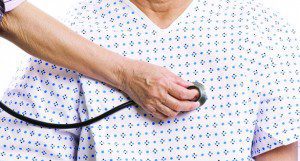 Coronary artery disease is the #1 killer in America. Most people with coronary artery disease are unaware that they have it because they haven’t experience any symptoms. More than half the time, it’s only discovered after the person has a heart attack, or worse, dies suddenly. The sad fact is, many of these deaths could have been prevented. Studies have shown that heart/calcium scores can predict coronary artery disease with significantly higher accuracy than tracking standard risk factors.
Coronary artery disease is the #1 killer in America. Most people with coronary artery disease are unaware that they have it because they haven’t experience any symptoms. More than half the time, it’s only discovered after the person has a heart attack, or worse, dies suddenly. The sad fact is, many of these deaths could have been prevented. Studies have shown that heart/calcium scores can predict coronary artery disease with significantly higher accuracy than tracking standard risk factors.
Cardiac calcium scoring uses a special X-ray called a computed tomography (CT) scan to check for the buildup of calcium on the walls of the arteries of the heart (coronary arteries). Calcium is a marker of coronary artery disease (CAD). This screening is used to identify heart disease in an early stage and to determine how severe it is. Cardiac calcium scoring is also called coronary artery calcium scoring.
Calcified plaque in the coronary arteries can narrow the arteries and affect blood flow to the heart and can result in painful angina or a heart attack. Calcium scoring is the most effective non-invasive method currently available to accurately identify the presence of early coronary artery disease.
Who should have a Calcium Scoring Screening?
The goal of a cardiac CT for calcium scoring is to detect coronary artery disease (CAD) at an early stage in individuals who do not yet have any symptoms, but are at risk for the disease. The overall risk for CAD increases with age. Calcium Scoring is most often suggested for males aged 40 years or older, and for females aged 50 and over.
Other significant risk factors for CAD include:
. A family history of heart disease
. Diabetes or a family history of diabetes
. High blood pressure
. High blood cholesterol levels
. Cigarette smoking
. Being overweight or obese
. Being physically inactive
How does the procedure work?
The CT scanner is a large, square machine with a circular opening. The patient lies on their back on the exam table which moves into the center of the machine. The scanner does not enclose the entire body and the patient’s head remains outside the unit. Electrodes (small metal discs) will be attached to the chest and to an ECG machine that records the electrical activity of the heart and makes it possible to scan at times when the heart is not actively contracting. The patient may be asked to hold their breath for 20 to 30 seconds while images are recorded. Within the machine, a rotating gantry moves around the patient’s body taking x-rays to produce the images, which are reconstructed by a computer in an adjoining room using special software. The CT scan does expose the patient to a same amount of radiation, but the risks of cardiovascular disease largely outweigh the risks of this limited exposure.
What will the screening show?
The detailed heart images allow cardiologists to determine the amount of coronary calcium present in the heart. Calcium Scoring can suggest the presence of CAD even when the coronary arteries are less than 50 percent narrowed. Other cardiac tests may not reliably detect this level of blockage, and more than half of all heart attacks occur with less than 50 percent narrowing.
A negative cardiac CT scan that shows no calcification within the coronary arteries suggests that atherosclerotic plaque is minimal, and that the chance of developing coronary artery disease over the next two to five years is low. A positive test means that coronary artery disease is present even if you have no symptoms. The amount of calcification – expressed as a score – can be an indication of the probability of a heart attack (myocardial infarction) in the coming years. Based on screening results, a physician can help the patient determine the best course of action to manage the disease and reduce cardiovascular risks. Options may include clinical interventions, medications and/or lifestyle modifications. Early detection offers the opportunity to reverse the blockage of arteries and lower the risk of a future heart attack.
Treating coronary artery disease early is always preferable to treating it after it has become more severe and symptomatic. The clearest benefit of the screening is detecting treatable or curable disease, which has been linked clearly to saving lives. But there is also a great benefit for those in whom no disease is detected – the majority of those tested. As has been proven with mammography, individuals who take charge of their health achieve a heightened sense of empowerment and peace of mind.
To learn more about screening for coronary heart disease and calcium scores call 239-593-4200; or to schedule a screening test please call 239-593-4222. Don’t wait until fatal symptoms (stroke or heart attack) occur, take charge of your heart health today!
239-593-4222
www.naplesxray.com
Our locations:
Plaza @ 311 Tamiami Trail N., Suite 104
Naples, Florida 34102
North @ 1715 Medical Blvd.
Naples, Florida 34110
East @ 6400 Davis Blvd., Suite 101
Naples, Florida 34104









